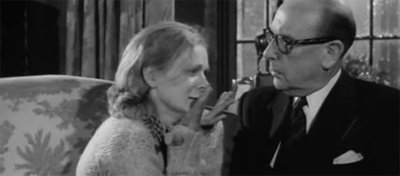
As part of the “For the Love of Film” blogathon, I’ll be taking a look at Alfred Hitchcock’s contributions to his celebrated anthology series Alfred Hitchcock Presents. I’ll be looking at some of the episodes of the classic show that he directed. The “For the Love of Film” blogathon this year is raising money to keep one of Hitchcock’s earlier works, The White Shadow (which he wrote, edited, designed and assistant-directed), available on-line and streaming for free. It’s a very worthwhile cause and you can donate here.
Wet Saturday is what you’d get if you crossed a Hitchcock murder mystery with a very British farce. It’s a bit of a strange cocktail, a comedy of manners about a sordid murder, but Hitchcock makes it work, in no small part to the work of a fantastic ensemble cast. Any excuse to see Hitchcock working with John Williams is worth the price of admission, even if the veteran performer finds himself relegated to a supporting role here. Sir Cedric Hardwicke excels as the patriarch of a proud British family who has to deal with the inconvenience of a murder on the family estate.
Indeed, the title card even credits Hardwicke as “Sir Cedric Hardwicke”, setting the tone for the episode to follow. It’s a wonderfully grim comedy as an upper class family lament the fact their daughter has murdered a schoolmaster. “I don’t understand, why should such a terrible thing happen to us?” Mrs. Princey laments, and that’s about as much thought as the poor schoolmaster gets for the entirety of the episode as the family starts scheming and plotting to cover up their involvement in the murder.
“I always find it heartwarming to see a family standing shoulder-to-shoulder in the face of adversity,” Hitchcock notes in his (as usual) tongue-in-cheek closing monologue. It’s a rather wonderful skewering of the British class system, where social standing and the value of the family name is much more important than some trifling inconvenience like a murder. “Our family’s held a position of respect in this community for generations,” Mister Princey tells his family. “I do not intend to have that position destroyed by the stupidity of one foolish female.” Don’t you just hate it when the kids ruin your family’s prestigious reputation?
Hardwicke is great in the lead, exuding that sense of disconnected British sophistication, remarkably self-absorbed. He’s a father who doesn’t want his daughter declared insane or tried for murder. Not for her own sake, mind you. He ponders, “I could hardly live here after that, could I?” As his daughter confesses the emotional circumstances that led her to kill her lover, Princey has little time for her obvious distress. “Don’t cry, it’s a luxury you can’t afford.” I don’t know how it’s possible for a man look both frustrated and bored while listening to the intimate details of a sordid murder, but Hardwicke does a sensational job convincing us that Pricey would rather be listening to the cricket.
Indeed, the murder itself is such an afterthought, beyond its ramifications to his good name, that he seems to give it very little actual thought. “Why did she kill him?” Captain Smollet asks his old friend. Princey replies dismissively, “Oh, it’s one of those disgusting things. Rather pitiable, as a matter of fact.” He has more important things on his mind, like setting up an old family friend to take the fall. The set-up is like something out of a noir film, but Hitchcock manages an excellent job of playing it as farce, thanks to superb cast. Due to the incompetence of everybody around him, we almost root for the sinister Mister Princey to succeed against what are overwhelming odds.
Tita Purdom is great as his distraught daughter who really just wants somebody to listen to her. Jered Barclay is superb as Princey’s slow-witted son George, who has been so spoiled by his upbringing that he seems blissfully unaware that there are any stakes at all in what is happening. I love that he seems to have completely accepted his father’s opinion of him as a half-witted fool. Kathryn Givney does a wonderful job as Princey’s wife, so is so disconnected from everything that we seldom see her even stand up. And, of course, it goes without saying that John Williams is impressive as Smollet, demonstrating that great comic timing that served him so well in Back for Christmas.
As usual, Hitchcock gleefully subverts the harsh moral standards of the time, by playing with the moral of the story in question. Towards the end, Mister Princey rather cleverly attempts to turn his blackmail and frame-up scheme into a moment of family bonding. Reflecting on the fact that he seems to solved the problem at hand, he tries to offer some motivational advice to George, “I hope you’ll let this situation be an example to you boy. It’s a rare problem that won’t yield to a little thought and patience.” Hitchcock himself jokingly suggests the story represents a victory for traditional family values.
Of course, as usual, Hitchcock is forced to stick a conventional happy ending on to the tale, where the family cannot escape their evil deeds unpunished. As often occurs when it looks like a villain might escape justice, Hitchcock’s closing epilogue puts the matter to rest and assures the audience that, the last half-hour to the contrary, crime does not pay. And, as is also usual for Hitchcock’s “necessary gestures towards morality”, there’s a healthy dose of sarcasm behind the director’s attempt to wrap things up. “The Princey’s received substantial sentences,” we’re told, after the fact, before Hitchcock goes on to inform us that Mister Princey was clubbed to death by his own daughter.
Wet Saturday is a fun addition toAlfred Hitchcock Presents, opening the second season with a dash of fun. It’s amazing how much freedom Hitchcock had to tell different forms of stories as part of his American television show, and it’s impressive that he even managed to fit in a farce about the very British class system to open the second year of the show.




